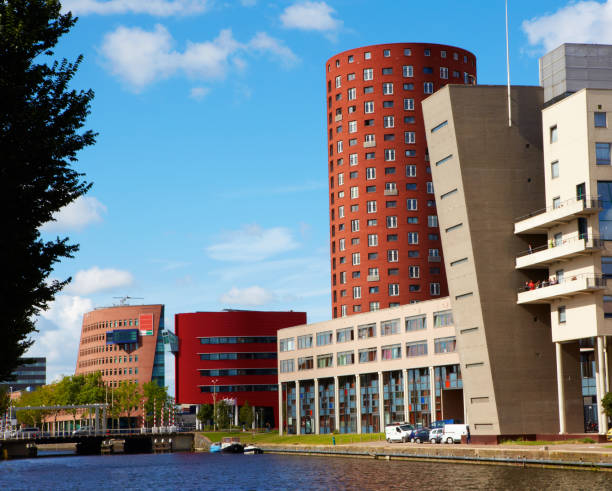Considering studying in the Netherlands? Known for its vibrant culture, high-quality education, and welcoming environment, the Netherlands is a top choice for international students. However, before beginning your educational journey, understanding the study visa process is crucial. This guide covers everything you need to know about the Netherlands Study Visa for international students, including eligibility, application steps, sponsorship, and tips for an easy transition.
Understanding the Netherlands Study Visa
To qualify for a study visa, you must first be accepted by a recognized educational institution in the Netherlands, such as a university or college accredited by the Dutch Ministry of Education.
- Proof of Financial Means
You must prove that you can support yourself financially during your studies. This includes covering tuition, living expenses, and health insurance. The required amount may vary based on your program and personal circumstances. - Health Insurance
Health insurance is mandatory while studying in the Netherlands. You can either acquire Dutch health insurance or use an international policy that covers medical expenses. - Language Proficiency
If your program is in English, you’ll need to demonstrate language proficiency through tests like IELTS or TOEFL. For Dutch-taught programs, a Dutch language proficiency test may be required. - Valid Passport
Ensure your passport is valid for the entire duration of your stay in the Netherlands.
Netherlands Study Visa Application Process
Here’s a breakdown of the study visa application steps:
- Acceptance from a Dutch Institution
First, apply to a recognized educational institution in the Netherlands. Once accepted, you’ll receive an official acceptance letter required for your visa application. - Gather Required Documents
Required documents generally include:- Valid passport
- Acceptance letter
- Proof of financial means
- Health insurance details
- Language proficiency test results
- Passport-sized photos
- Complete the Visa Application Form
Fill out the application form, which is usually available on the Dutch embassy or consulate website in your country. Double-check for accuracy. - Submit Your Application
Submit your application and supporting documents to the Dutch consulate or embassy, and be prepared to pay the visa processing fee. - Attend an Interview (if required)
An interview may be requested to discuss your study plans, finances, and goals. - Processing Time
Visa processing typically takes 4–12 weeks, and you can track your application status through the embassy. - Receive Your Visa
Once approved, your study visa allows entry into the Netherlands. Ensure all visa details are correct before departure.
Visa Sponsorship
International students often require a visa sponsor, usually their educational institution, which will support your visa application by confirming your acceptance and eligibility.
Institutional Responsibilities
Your institution provides the official acceptance letter, confirms your eligibility, and may assist with your residence permit application if needed.
Institutional Requirements
To sponsor visas, institutions must:
- Be registered with the Dutch Immigration and Naturalisation Service (IND)
- Offer recognized programs accredited by the Dutch Ministry of Education
- Adhere to regulations for international students
Living in the Netherlands as a Student
Once you have your visa, here are key aspects of student life to consider:
- Accommodation
Options include university dorms, shared apartments, and private rentals. Start early, especially in cities like Amsterdam and Utrecht. - Bank Account
Opening a Dutch bank account can simplify financial management. You’ll need identification, proof of residency, and possibly proof of enrollment. - Healthcare
Health insurance is required, and it’s helpful to register with a local general practitioner (GP). - Cultural Integration
Embrace Dutch culture by attending events, joining student groups, and engaging with peers to build a support network. - Student Support Services
Dutch universities often offer services like counseling, academic advising, and language courses to support students.
Working While Studying in the Netherlands
You may be allowed to work part-time, depending on your nationality:
- EU/EEA Students: You can work without restrictions.
- Non-EU/EEA Students: You’re allowed to work up to 16 hours a week during the academic year or full-time in summer. A work permit may be required, arranged by your employer.
Popular job search platforms include Indeed, Glassdoor, and local job boards.
Transitioning to a Long-Term Visa
If you wish to stay in the Netherlands after completing your studies, several long-term visa options are available:
- Orientation Year for Graduates
This visa allows graduates to stay for up to one year post-graduation to seek employment. - Highly Skilled Migrant Visa
If you secure a job offer meeting specific salary requirements, you may qualify for this visa. - Permanent Residency
After a certain period and meeting criteria like language proficiency and financial stability, you can apply for permanent residency.
Conclusion
Studying in the Netherlands is an incredible opportunity to experience a new culture while receiving a quality education. By understanding the study visa process and making the necessary preparations, you’ll have a smoother transition and a rewarding academic journey. Whether you return home or choose to stay, your time in the Netherlands will provide valuable experiences and knowledge.
The Netherlands Study Visa, or MVV (Machtiging tot Voorlopig Verblijf) and VVR (Verblijfsvergunning voor Studiedoeleinden), is required for non-EU/EEA students aiming for higher education in the Netherlands and covers the duration of your study program.
Types of Study Programs
- Bachelor’s Degree Programs: Three to four years in various fields like arts, sciences, and engineering.
- Master’s Degree Programs: One to two years of advanced study in a specific field.
- Ph.D. Programs: Three to four years of research under faculty supervision.
- Exchange Programs: Available for students from foreign institutions for unique learning experiences.
The duration of your study visa aligns with your program, ranging from one year for a master’s to three or more years for a bachelor’s or Ph.D.
